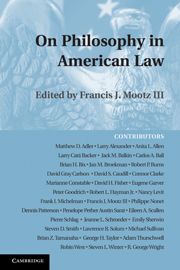Book contents
- Frontmatter
- Contents
- Introduction
- PART I KARL LLEWELLYN AND THE COURSE OF PHILOSOPHY IN AMERICAN LAW
- PART II PHILOSOPHICAL PERSPECTIVES ON LAW
- PART III AREAS OF PHILOSOPHY AND THEIR RELATIONSHIP TO LAW
- PART IV PHILOSOPHICAL EXAMINATIONS OF LEGAL ISSUES
- 18 Law as Premise
- 19 Doing Justice to Justice: Paul Ricoeur
- 20 Love Is All You Need: Freedom of Thought versus Freedom of Action
- 21 Legal Philosophy over the Next Century (While We Wait for the Personal Rocket Transportation We Were Promised)
- 22 Atmospherics: Abortion Law and Philosophy
- PART V LAW, RHETORIC, AND PRACTICE THEORY
- PART VI QUESTIONING THE RELATIONSHIP BETWEEN PHILOSOPHY AND AMERICAN LAW
- PART VII COMMENTARIES
- Contributors and Selected Bibliography
- Name Index
- References
22 - Atmospherics: Abortion Law and Philosophy
Published online by Cambridge University Press: 31 July 2009
- Frontmatter
- Contents
- Introduction
- PART I KARL LLEWELLYN AND THE COURSE OF PHILOSOPHY IN AMERICAN LAW
- PART II PHILOSOPHICAL PERSPECTIVES ON LAW
- PART III AREAS OF PHILOSOPHY AND THEIR RELATIONSHIP TO LAW
- PART IV PHILOSOPHICAL EXAMINATIONS OF LEGAL ISSUES
- 18 Law as Premise
- 19 Doing Justice to Justice: Paul Ricoeur
- 20 Love Is All You Need: Freedom of Thought versus Freedom of Action
- 21 Legal Philosophy over the Next Century (While We Wait for the Personal Rocket Transportation We Were Promised)
- 22 Atmospherics: Abortion Law and Philosophy
- PART V LAW, RHETORIC, AND PRACTICE THEORY
- PART VI QUESTIONING THE RELATIONSHIP BETWEEN PHILOSOPHY AND AMERICAN LAW
- PART VII COMMENTARIES
- Contributors and Selected Bibliography
- Name Index
- References
Summary
Respect for human life finds an ultimate expression in the bond of love the mother has for her child.
(Gonzales 2007: 1634)From the positivists the realists take the insistence on concrete data. … The profession at large still shows, at times, the influence of the natural law.
(Llewellyn 1934: 212)While we find no reliable data to measure the phenomenon, it seems unexceptionable to conclude some women come to regret their choice to abort the infant life they once created and sustained. … Severe depression and loss of esteem can follow.
(Gonzales 2007: 1634)Police officers with cadaver-sniffing dogs, shovels and a backhoe dug in the backyard of a home Monday where the bodies of four infants have been found since last week. The police say the infants belong to Christy L. Freeman, 37, a taxi company owner and mother of four. Ms. Freeman has been charged with murder in the death of one of the infants, a male fetus in the 26th week of gestation found in a vanity under a bathroom sink.
(“Bodies” 2007: A15)In 1934, Karl N. Llewellyn published a lively essay trumpeting the dawn of legal realism, “On Philosophy in American Law.” The charm of his defective little piece is its style and audacity. A philosopher might be seduced into reading Llewellyn's essay by its title; but one soon learns that by philosophy Llewellyn only meant atmosphere. His concerns were the “general approaches” taken by practitioners, who may not even be aware of having general approaches.
- Type
- Chapter
- Information
- On Philosophy in American Law , pp. 184 - 192Publisher: Cambridge University PressPrint publication year: 2009



